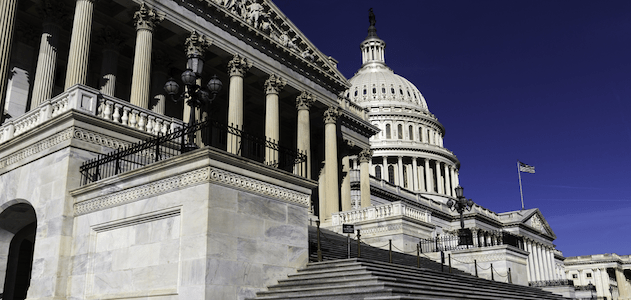[Update: Article updated to include a statement from the Mortgage Bankers Association.]
The fees charged by Fannie Mae and Freddie Mac to guarantee loans will likely not go to pay for new roads, after the House of Representatives voted overwhelmingly to remove a controversial portion of a massive transportation bill that would have used g-fees to offset the cost of the bill.
The House of Representatives passed its version of the Developing a Reliable and Innovative Vision for the Economy Act, also called the DRIVE Act, on Thursday.
Not included in the bill was a “pay-fors” – the mechanism which funds the bill – that would have significantly delayed scheduled cuts in g-fees.
Increases in Fannie and Freddie’s g-fees, which were originally put in place in 2011, are set to decline by 10 basis points at the end of 2021.
To fund part of the transportation bill, the decrease in g-fees would be delayed until the end of 2025 – a four-year extension of the increased g-fees.
Thanks to the 354-72 passage an amendment put forth by Rep. Randy Neugebauer, R-Tex., and Bill Huizenga, R-Mich., the g-fee section of the highway bill is no more.
The House then voted on the full bill, and passed it with by a vote of 363-64.
The passage of the Neugebauer-Huizenga amendment was welcomed by the Mortgage Bankers Association.
“MBA commends the full House for its strong bipartisan vote to pass the Neugebauer-Huizenga amendment and remove from the highway bill an extension of higher Fannie Mae and Freddie Mac guarantee fees that would have served as a tax on homeownership, as well as a harmful reduction in the dividend paid on Federal Reserve bank stock, MBA President and CEO David Stevens said. "Given the widespread support (354 to 72) for the amendment from Republicans and Democrats alike, we will continue to strongly advocate for the House position as House and Senate leaders meet to reconcile the differences between the two chambers’ highway bills.”
The bill now goes to the Senate, where its version also carries the g-fee pay-for. But the g-fee pay-for has its opponents in the Senate as well.
Earlier this year, Sen. Mike Crapo, R-Idaho, and Sen. Mark Warner, D-Va., introduced budget point of order that would prevent g-fees from being used to offset federal spending, a practice the Senators call a “budgetary gimmick” and a “back door tax” on homeowners.
Later, Crapo and Warner sent a letter to Senate Majority Leader Mitch McConnell, R-Ky., and Senate Minority Leader Harry Reid, D-Nev., saying that any increase or extension of g-fee standards should be used to protect taxpayers from mortgage losses and to repay the federal bailout, not for unrelated programs.
“Each time guarantee fees are extended, increased and diverted for unrelated spending, homeowners are charged more for their mortgages and taxpayers are exposed to additional risk,” Crapo and Warner said in their letter.
“Attempts to increase of extend these fees makes it more difficult to reform our housing finance system and wind down Fannie Mae and Freddie Mac,” the letter continues.
In the Senate Committee on Environment and Public Works explanation of the funding of the bill, which can be read here, it states, “the regulator for Fannie Mae and Freddie Mac recently completed a review of the guarantee fees and found ‘no compelling economic reason to change the general level of fees’ which are continued by this provision.”
But Crapo and Warner argue that any use of g-fees for unrelated federal spending would actually cause the government to overspend and “greatly increase” the federal deficit.
“It is our collective responsibility to uphold our bipartisan budget scoring rule to protect against overspending that would increase the deficit,” Crapo and Warner write.
“We urge you to follow-through on the commitment to not use Fannie and Freddie as a piggybank in the Budget Resolution and remove the extension of guarantee fees from the transportation reauthorization,” the letter concludes.





